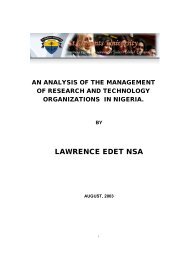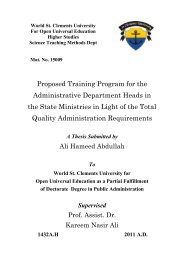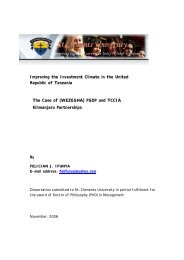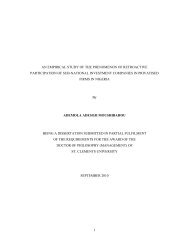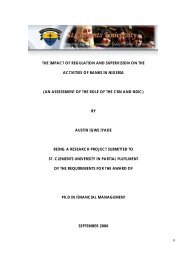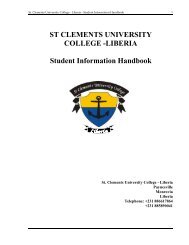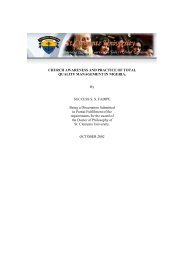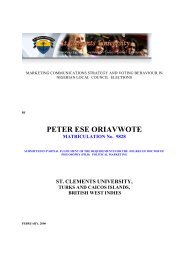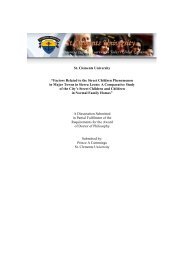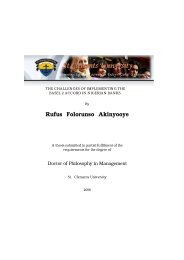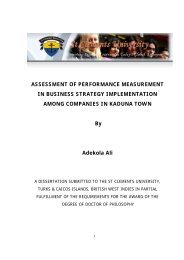The role of informal microfinance institutions in saving
The role of informal microfinance institutions in saving
The role of informal microfinance institutions in saving
You also want an ePaper? Increase the reach of your titles
YUMPU automatically turns print PDFs into web optimized ePapers that Google loves.
Community pressure, access to <strong>in</strong>formation and close follow up all have been comb<strong>in</strong>ed to<br />
enhance access even without hav<strong>in</strong>g to use conventional forms <strong>of</strong> collateral.<br />
A number <strong>of</strong> rural schemes operate under a sav<strong>in</strong>g-first arrangement whereby potential<br />
borrowers have to pay cash deposit before they can apply to borrow a maximum <strong>of</strong> twice<br />
the amount they have saved with the programme, or at times the borrower would have to<br />
save up to 25% <strong>of</strong> the loan requested. Thus, loan size is l<strong>in</strong>ked to level <strong>of</strong> sav<strong>in</strong>gs. With the<br />
high borrow<strong>in</strong>g transactions costs associated with the loans, farmers who can deposit only<br />
small amount <strong>of</strong> money can hardly participate <strong>in</strong> the programmes. As such, l<strong>in</strong>k<strong>in</strong>g the<br />
amount <strong>of</strong> loan to the level <strong>of</strong> sav<strong>in</strong>gs, <strong>in</strong> try<strong>in</strong>g to m<strong>in</strong>imize risk costs, prevents poor<br />
people to enhance their credit worth<strong>in</strong>ess by demonstrat<strong>in</strong>g their sav<strong>in</strong>gs abilities to<br />
lenders. Thus the regulation limits access to loans by their poor farmers. Under these<br />
circumstances, poor sav<strong>in</strong>gs through <strong>in</strong>stitutional arrangements such as SACCOs helps to<br />
address this problem.<br />
<strong>The</strong> case <strong>of</strong> the l<strong>in</strong>kage between SACCOs and Kilimanjaro Community Development Bank<br />
(KCB) can be used here to draw useful lessons. With failures <strong>of</strong> rural f<strong>in</strong>ancial <strong><strong>in</strong>stitutions</strong><br />
with<strong>in</strong> the region the SACCOs together with the <strong>of</strong>fice market<strong>in</strong>g primary cooperatives and<br />
their unions jo<strong>in</strong>ed up to form what is currently known as Kilimanjaro Community Bank.<br />
Hav<strong>in</strong>g developed from the grassroots it has given the people <strong>of</strong> the region a sense <strong>of</strong><br />
ownership and a belief that KCB represents the local community and has contributed to its<br />
susta<strong>in</strong>ability. <strong>The</strong> bank has also strategically tapped <strong>in</strong>to the c<strong>of</strong>fee economy by provid<strong>in</strong>g<br />
farmers with direct deposit facilities for the proceeds earned from c<strong>of</strong>fee sales, s<strong>in</strong>ce the<br />
people <strong>of</strong> the region have a long history <strong>of</strong> community activities based around c<strong>of</strong>fee<br />
economy.<br />
By hav<strong>in</strong>g a clear organizational structure, objectives, key tasks and restrict<strong>in</strong>g share hold<strong>in</strong>g<br />
to primary rural co-operative societies and particular SACCOs the bank has made<br />
considerable strides s<strong>in</strong>ce its establishment.<br />
Although the ma<strong>in</strong> focus <strong>of</strong> the bank is rural development the bank has only managed to<br />
open its ma<strong>in</strong> <strong>of</strong>fice and customer service desk <strong>in</strong> Moshi town. But this has not deterred the<br />
bank from pursu<strong>in</strong>g its ma<strong>in</strong> objective <strong>of</strong> reach<strong>in</strong>g the rural areas. In this regard, it<br />
56



